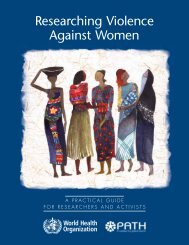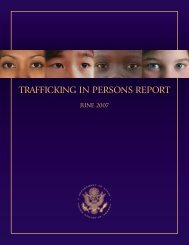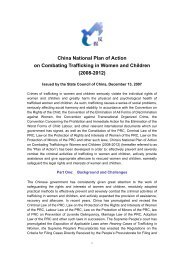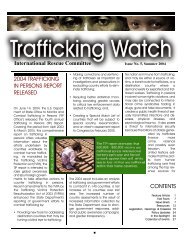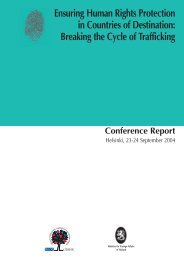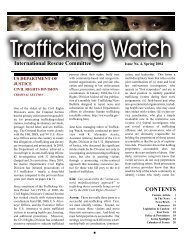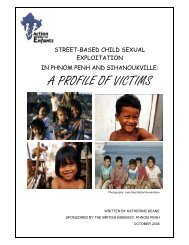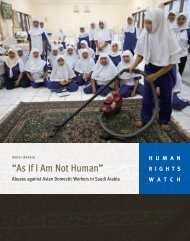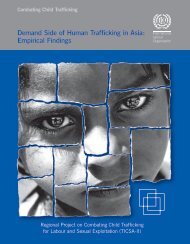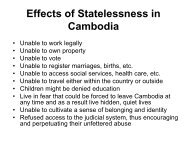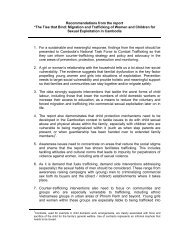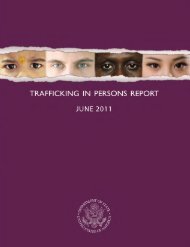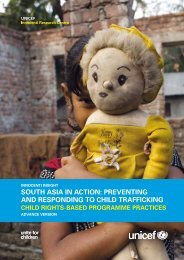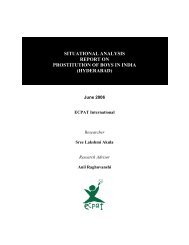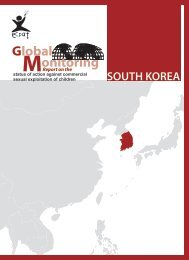Download PDF - Violence Against Children - East Asia and the ...
Download PDF - Violence Against Children - East Asia and the ...
Download PDF - Violence Against Children - East Asia and the ...
You also want an ePaper? Increase the reach of your titles
YUMPU automatically turns print PDFs into web optimized ePapers that Google loves.
The Philippines<br />
practical examples answer <strong>the</strong> question of<br />
what is <strong>the</strong> end goal of organising children:<br />
“It gives exposure to children’s concerns <strong>and</strong><br />
views, moving <strong>the</strong>m from invisibility to visible in<br />
<strong>the</strong> public domain.” 5<br />
Child participation is a key part of World<br />
Vision’s work. Indicators are focused on<br />
changes in <strong>the</strong> lives of children <strong>the</strong>mselves, as<br />
<strong>the</strong>y become change agents in <strong>the</strong>ir<br />
communies with increased recognition from<br />
community leaders.<br />
Most of <strong>the</strong> key informants to this study<br />
were well-versed in <strong>the</strong> political ordinances<br />
at national, provincial <strong>and</strong> local levels with<br />
regard to child protection. While this is useful<br />
to gain approval for children’s organisation, it<br />
is also an opportunity to advocate on policy<br />
implementation.<br />
Impact of <strong>the</strong> project<br />
Young leaders<br />
Photo: Laurence Gray<br />
Building hope <strong>and</strong> promoting child rights<br />
through local agents of change is an<br />
achievement. Filipino children have become<br />
agents of change to increase access to<br />
schooling in villages <strong>and</strong> gain greater<br />
responses from different levels of<br />
government on children’s issues. These<br />
World Vision has participated with o<strong>the</strong>rs<br />
in influencing <strong>the</strong> Board of Child Welfare to<br />
prioritise a request that <strong>the</strong> Provincial<br />
Government develop child protection<br />
legislation. Governance at provincial level in<br />
Bohol has been influenced to identify, through<br />
<strong>the</strong> Board of Child Welfare, <strong>the</strong> following<br />
priority areas for child protection:<br />
• domestic violence<br />
• drug addiction<br />
• sexual abuse<br />
• child involvement in armed conflict.<br />
A significant development in Bohol has been<br />
<strong>the</strong> children’s own role in identifying what<br />
<strong>the</strong>y consider to be priority concerns to be<br />
addressed. One was <strong>the</strong> problem of solvent<br />
sniffing; ano<strong>the</strong>r <strong>the</strong> need to advocate for<br />
safe <strong>and</strong> decent housing for children <strong>and</strong><br />
families; <strong>and</strong> a third has been <strong>the</strong> need for<br />
children to advocate for peace.<br />
Key World Vision activities include:<br />
• training children/youth in leadership <strong>and</strong><br />
facilitation<br />
• securing children’s opportunities to access<br />
quality education through day care centre<br />
construction, provision of playground<br />
facilities, school supplies, learning facilities,<br />
repair of school buildings <strong>and</strong> subsidised<br />
school fees<br />
• promotion of values such as respect,<br />
tolerance, forgiveness, compassion, justice,<br />
<strong>the</strong> God-given dignity of each person, <strong>and</strong><br />
participation in community service <strong>and</strong><br />
faith-based activities 6<br />
• organising a 30-member children’s <strong>the</strong>atre<br />
group as an advocacy tool to promote<br />
child rights<br />
5<br />
Exp<strong>and</strong>ing <strong>Children</strong>’s Participation in Social Reform (ECPSR) project, Initiative <strong>Against</strong> Child Labor End-Of-Term Evaluation, Manila, 2001. See also: Building a<br />
Child-Friendly Nation published by <strong>the</strong> National ECPSR coalition of <strong>the</strong> four NGOs (World Vision Development Foundation, PLAN International, Christian<br />
<strong>Children</strong>’s Fund <strong>and</strong> ERDA Foundation), Manila, 2002. For reports of some achievements of <strong>the</strong> ECPSR project, see:<br />
http://www.unicef.org/philippines/Archive/ECPSR.htm <strong>and</strong> http://www.unicef.org/philippines/Archive/CFCL.htm<br />
6 In most parts of <strong>the</strong> Philippines, Christianity is very visible <strong>and</strong> integrated into daily life, in a similar way to (for example) <strong>the</strong> high visibility of <strong>the</strong> Hindu faith<br />
in India or Bali. The study coordinator’s perception is that in <strong>the</strong> Bohol context, <strong>the</strong> church is seen as an important social institution of a community where<br />
faith has an important role; a focal point that is accessible <strong>and</strong> responsive to children’s concerns <strong>and</strong> provides a unifying or mobilising influence for change.<br />
In o<strong>the</strong>r countries/communities where Christianity is a minority religion, faith-based activities, if appropriate, would take a different form.<br />
World Vision’s underst<strong>and</strong>ing of <strong>the</strong> Christian faith is holistic – meaning that it involves a connection between personal faith, service to o<strong>the</strong>rs, human rights<br />
<strong>and</strong> social justice, <strong>and</strong> caring for <strong>the</strong> earth. World Vision is interested in empowering people, including children, to be leaders in promoting compassion,<br />
justice <strong>and</strong> human dignity <strong>and</strong> rights, whatever <strong>the</strong>ir faith. WVDF recognises that <strong>the</strong> imposition of a majority “Christian” religion/culture has been<br />
associated with dispossession or injustice in some parts of <strong>the</strong> Philippines, <strong>and</strong> that even within a mostly Christian province, not everyone shares <strong>the</strong> same<br />
faith. World Vision respects freedom of religion, <strong>and</strong> proselytising is against World Vision International policy.<br />
59



